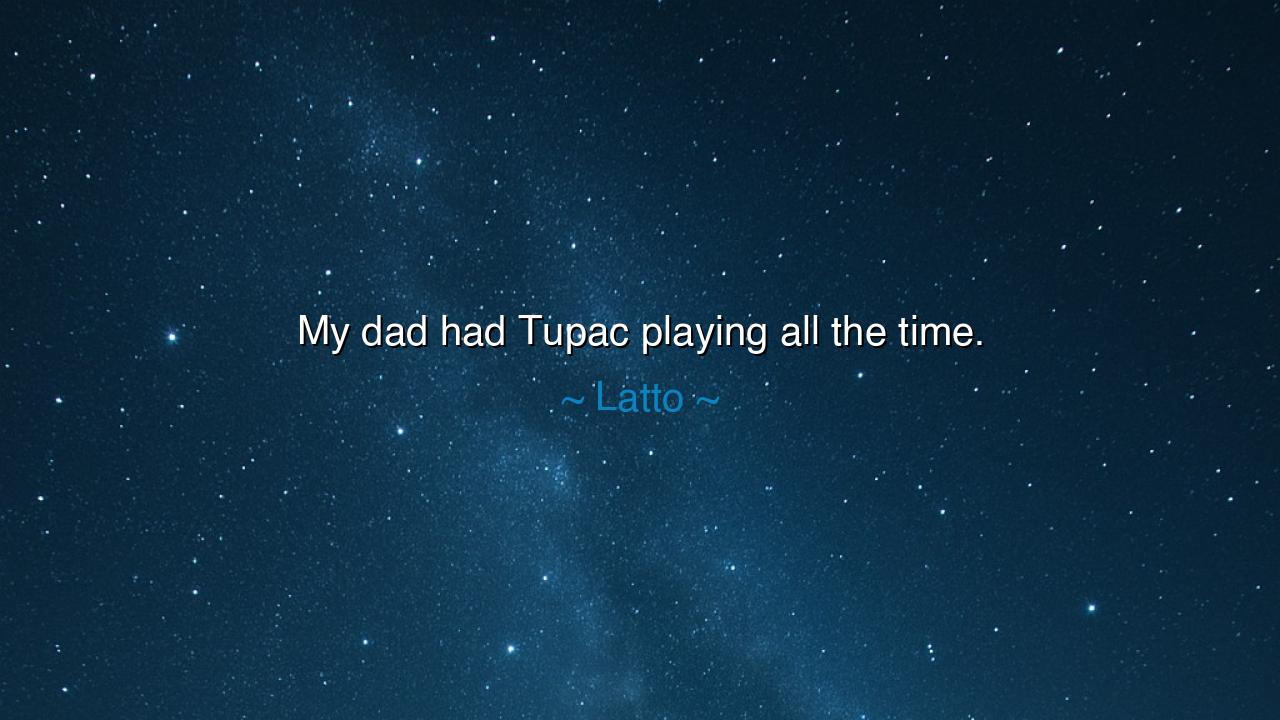
My dad had Tupac playing all the time.






The words of Latto, simple yet filled with the quiet weight of legacy, echo across generations: “My dad had Tupac playing all the time.” To the untrained ear, they may seem casual, a fleeting memory of sound and rhythm. But to the soul that listens deeply, these words reveal a sacred truth — that music, when born of truth and struggle, becomes more than melody. It becomes inheritance, memory, and identity. In her father’s choice of song lies a lineage of wisdom, pain, and rebellion — a rhythm that shaped her spirit before she even understood its meaning.
In the ancient way, this is what we would call the passing of the flame — the unseen inheritance that a parent gives a child not through wealth or instruction, but through presence. Her father, without perhaps intending it, gave her something greater than gold: the sound of Tupac, the voice of resistance and resurrection. That voice, born in the fire of oppression and expressed through poetry and rage, became part of her soul’s foundation. Just as a child raised beside the sea comes to understand the tides without study, so too did Latto learn the rhythm of strength, truth, and authenticity through her father’s music.
Tupac Shakur was not merely an artist; he was a prophet clothed in pain, a poet of the streets who spoke in verses that bled. His songs were the cries of a generation — of mothers and sons forgotten by the world, of dreams both broken and unbroken. To grow up hearing him was to grow up in a temple of raw truth. When Latto says, “My dad had Tupac playing all the time,” she reveals that her spirit was molded not by silence, but by fire. In those lyrics, she heard not only rhythm, but reality — a call to self-knowledge, to pride, to the courage of voice.
The ancients would have called such an upbringing education of the soul. For wisdom does not always come from scrolls and classrooms; sometimes it is carried in the rhythm of drums, in the poetry of pain, in the voices that refuse to be silenced. Think of Spartacus, who learned the art of freedom not from a teacher but from the whip of a master. His rebellion was born not of lectures but of the music of chains. So too does art teach — it speaks in a language that reaches the bones. And when the young are surrounded by truth in art, their hearts grow strong, their minds sharp, and their voices brave.
Latto’s words remind us that what we surround our children with becomes their foundation. Her father’s choice of music was not entertainment, but a form of spiritual shaping. Tupac’s message — of self-respect, of struggle, of defiance — became the soil from which her own confidence and artistry grew. Just as a blacksmith tempers iron with heat and repetition, so too does the spirit become forged by what it hears, sees, and repeats. The songs of our youth are not forgotten; they live in us, shaping our courage and defining our rhythm.
And yet, beyond the music lies a greater truth: every generation passes forward what it holds most sacred. For Latto’s father, it was the truth of Tupac — the art that told stories of survival and strength. For others, it may be a book, a prayer, a tradition, or a lesson whispered at night. But the power remains the same: to pass the flame so that the next generation may walk through darkness without fear. The true inheritance of a child is not gold, but meaning — not possessions, but perspective.
So, my listener, take heed of this quiet teaching: be mindful of the music that fills your home, the words that echo in your presence, the truths that shape your days. For you are always teaching — through what you love, what you repeat, and what you honor. Surround yourself with the voices that lift you, that awaken courage, that speak to the truth of your being. And when you pass those voices to others — to your children, your students, your companions — you pass not just sound, but soul.
Thus, the legacy of Latto’s father and Tupac’s voice becomes a mirror for all of us. Let the songs you live by be the ones that build strength. Let the words you cherish be those that free others. And remember: though the body perishes and time fades, the spirit endures through what we teach, what we share, and what we play “all the time.” In this way, the music never ends — it becomes eternity, humming softly through the generations yet to come.






AAdministratorAdministrator
Welcome, honored guests. Please leave a comment, we will respond soon